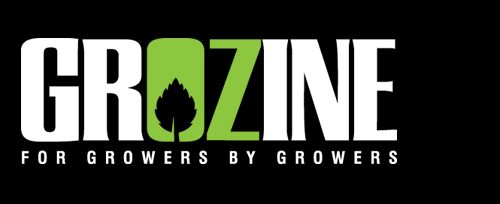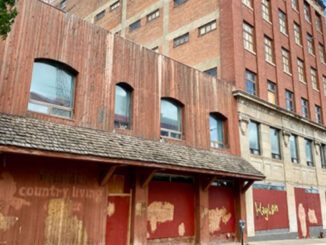
In southeast Calgary, a vertical farm prepares to bring rapid-growing leafy greens to shelves
Frozen food company McCain Foods Ltd. had invested more than $65 million in GoodLeaf Foods as of 2021 and contributed to a recent round of investment that saw GoodLeaf raise $150 million
Calgary Vertical Farm | Matt Scace |
IMAGE: The soon-to-be open GoodLeaf vertical farm in southeast Calgary is seen in this aerial photo.Courtesy Fillmore Construction Management Inc.
Barry Murchie describes a vertical farming facility as “a box within a box.”
Imagine a Costco- or Home Depot-like warehouse, the president and CEO of GoodLeaf Farms says, with floor-to-ceiling racks, where greens like baby spinach and micro broccoli rapidly grow. It’s a far cry from the rows upon rows of greens that grow in California and Arizona fields where most of Canada’s leafy greens come from.
And when GoodLeaf’s baby and micro greens hit grocery shelves in Calgary next month, it’ll mark another notch in the company’s rapid growth as a leading vertical farming company attempting to bring the new type of farming to scale.
The vertical farming company opened its first commercial farm in Guelph, Ont., in 2019 and is currently expanding into Calgary and Montreal. Facilities use LED lights to grow the greens on rapid timelines: its micro greens are harvestable within eight days and baby greens are ready in 18 days, Murchie said. Baby greens grown in an open-field format, such as arugula, spinach and romaine, take 45 to 60 days to grow, he said.
The company’s new 96,000-square-foot facility, which sits inside a warehouse in southeast Calgary, will cost an estimated $56 million, according to the province. (Alberta chipped in $2.73 million in grant funding for the project.)
When it first opens, the highly automated warehouse will operate at half capacity, providing 70 new jobs to the city. GoodLeaf has left room for operations to double in size.
Murchie said in an interview he’s been “pleasantly surprised” by the commitments the company has inked for the new farm, adding its greens will be on shelves of all major grocers in Calgary.
Operations will only expand when the farm sells out its full initial capacity, which could happen within the next six to 12 months, he said. When the Calgary and Montreal farms open, “a good percentage of that capacity will already be committed.”
“I would expect that in the not too distant future, we will be making plans for further expansion.”
Murchie touts the company’s greens as a “fundamentally better product” than its imported competitors, coming without pesticides, more nutrient-dense leaves and arriving at a price competitive with imported greens.
“We’re at price parity to organics,” he said.
Stable indoor growing environment seen as advantage over outdoor crops
Vertical farming also provides a stable year-round growing environment, an advantage it has over outdoor crops which can be susceptible to a host of factors such as drought and food-borne illnesses that damage production, Murchie said.
“The technology and the investment that GoodLeaf has made in creating a national network of farms really starts to bend the curve of supply, from import dependence to domestic confidence.”
McCain Foods Ltd., where Murchie worked for 25 years, has been a significant investor in GoodLeaf’s operations. Since 1994, he has worked for the company in executive roles in Japan, Singapore, the U.S., most recently serving as vice-president of commercial operations for North America.
In 2020, he transitioned from McCain to his current role as president and CEO of GreenLeaf.
McCain made its first investment in TruLeaf, GoodLeaf’s parent company, in 2018 and in February 2021 the well-known frozen food producer announced it had invested a cumulative $65 million in the company. At the time, GoodLeaf had only opened its first facility in Guelph.
If that moment was a seed, the company planted itself in healthy soil to grow.
GoodLeaf announced last December it had raised $150 million following added support from McCain and through a new partnership with Power Sustainable Lios, an agri-food-focused private equity investment firm.
GoodLeaf’s quickly expanding operations will be Canada’s first company attempting to bring indoor agriculture to scale, Murchie said.
“GoodLeaf is the leader in Canadian vertical farming, with best-in-class commercial operations, industry-leading food safety practices, and a strong food-first executive team,” Jonathan Belair, managing partner of Power Sustainable Lios, said in a statement after the capital raise.
When it comes to leafy greens production, vertical farming can be useful in supporting food security efforts and be part of a diversified food system, said Alex Wilkinson, a sustainability and environment consultant with CMR Consulting. He completed his PhD at the University in Calgary, where he, in part, studied perceptions and interest in using controlled-environment agriculture as a sustainable food source in Yukon.
“(Vertical farms) can produce a lot of leafy greens, you just need to make sure you have the demand for them,” he said.
One of the company’s advantages over outdoor growers is the farm’s ability to retain the water it used, resulting in 95 per cent less water used, Murchie said. Where water can evaporate before it hits the ground on outdoor farms, Murchie said GreenLeaf’s Guelph farm extracts the humidity from the grow room, returning 13,000 litres of water back to the system.
“Really, the only water that goes out of our facility is the water that is within the plants themselves.”
Original Article: https://calgaryherald.com/business/local-business/goodleaf-farms-vertical-farming-southeast-calgary



